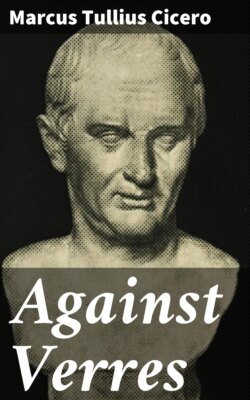Читать книгу Against Verres - Marcus Tullius Cicero - Страница 69
На сайте Литреса книга снята с продажи.
47
ОглавлениеTable of Contents
122But shall I first speak of his arrogance towards the Roman people, or his cruelty? Beyond all question, cruelty is the graver and more atrocious crime. Do you think then that these men have forgotten how that fellow was accustomed to beat the common people of Rome with rods? And indeed a tribune of the people touched on that matter in the public assembly, when he produced in the sight of the Roman people the man whom he had beaten with rods. And I will give you the opportunity of taking cognisance of that business at its proper time. 123But who is ignorant with what arrogance he behaved? how he disregarded every one of a low condition, how he despised them, how he did not account the poor to be free men at all? Publius Trebonius made many virtuous and honourable men his heirs; and among them his own freedman. He had had a brother, Aulus Trebonius, a proscribed man. As he wished to make provision for him, he put down in his will, that his heirs should take an oath to manage that not less than half of each man's share should come to Aulus Trebonius, that proscribed brother of his. The freedman takes the oath; the other heirs go to Verres, and point out to him that they ought not to take such an oath; that they should be doing what was contrary to the Cornelian law, which forbids a proscribed man to be assisted. They obtain from him authority to refuse the oath. He gives them possession; that I do not find fault with. Certainly it was a scandalous thing for any part of his brother's property to be given to a man who was proscribed and in want. But that freedman thought that he should be committing a wickedness if he did not take the oath in obedience to the will of his patron. 124Therefore Verres declares that he will not give him possession of his inheritance, in order that he may not be able to assist his proscribed patron; and also in order that that might serve as a punishment for having obeyed the will of his other patron. You give possession to him who did not take the oath. I admit your right to do so; it is a privilege of the praetor. You take it from him who has taken the oath. According to what precedent? He is aiding a proscribed man. There is a law; there is a punishment established in such a case. What is that to him who is determining the law? Do you blame him because he assisted his patron, who was in distress at the time, or because he attended to the wishes of his other patron, who was dead, from whom he had received the greatest of all benefits? Which of these actions are you blaming? And then that most admirable man, sitting on his curule chair, said this: "Can a freedman be heir to a Roman knight of such great wealth?" O how modest must the class of freedmen be, since he departed from that place alive! 125I can produce six hundred decrees in which, even if I were not to allege that money had interrupted justice, still the unprecedented and iniquitous nature of the decrees themselves would prove it. But that by one example you may be able to form your conjectures as to the rest, listen to what you have already heard in the previous pleading.
